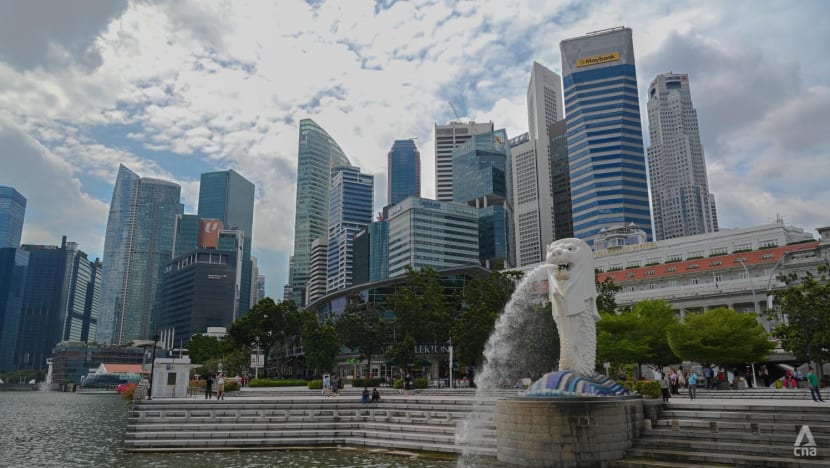Singapore attracted record S$22.5 billion in fixed asset investments last year, nearly double of 2021
More than 17,000 jobs are expected to be created in the coming years from investment commitments.

A view of Singapore's central business district and the Merlion on Nov 16, 2022. (File photo: CNA/Hanidah Amin)
SINGAPORE: Singapore attracted a record high of S$22.5 billion in fixed asset investments last year, which is set to create more than 17,000 jobs in the coming years, the Economic Development Board (EDB) said on Thursday (Feb 9).
In 2021, Singapore attracted S$11.8 billion in investments, down from S$17.2 billion committed in 2020.
The electronics sector drove last year’s performance, accounting for around two-thirds of the total fixed asset investment commitments.
"This outperformance relative to our goals was due to the exceptional influx of large manufacturing projects to meet the surge in global semiconductor demand, particularly during the first half of 2022," said EDB managing director Jacqueline Poh at a media briefing.
Fixed asset investments refer to the incremental capital investment in facilities, equipment and machinery by a company. Last year’s fixed asset investments far exceeded the EDB’s targets of S$8 billion to S$10 billion per year in the medium to long term.
"We are now at the end of this semiconductor supercycle and we are seeing chip demand soften. So I would like to reiterate we don't expect this level of investments to persist in the near term," she said.
The EDB also warned of a challenging business outlook ahead.
When the new projects are implemented fully in the coming years, they are expected to create 17,113 new jobs, and contribute S$20.6 billion to Singapore’s economy per year.
The majority of jobs created will be in hub and business services, while 27 per cent will be in advanced manufacturing and another 12 per cent will be in innovation.
Singapore also secured S$6.2 billion in total business expenditure last year, higher than the S$5.2 billion in 2021. Both figures are within the EDB’s targets of between S$5 billion and S$7 billion.
The headquarters and professional services sector accounted for around half of total business expenditure, which refers to a company’s incremental annual operating expenditure in Singapore, including wages and rental.
Infocommunications and media made the next biggest commitments in total business expenditure, representing more than 20 per cent of last year’s figures.
"More global businesses clearly use Singapore as a hub to build resilience in their operations, as well as to access regional and global markets," Ms Poh said.
INVESTMENT OUTLOOK, OPPORTUNITIES
Looking ahead, the EDB said it does not expect the same level of investments this year due to global macro uncertainties, intensifying competition for investments and a sharp slowdown in demand in the semiconductor industry.
EDB chairman Beh Swan Gin said higher interest rates will lead to dampened demand and a higher cost of capital.
"The two together will make many companies be more tentative about moving ahead with sizeable investments," he said.
Additionally, many developed economies have introduced "very aggressive policies".
"The US, for instance, introduced the Chips Act, they introduced the Inflation Reduction Act. And these are very attractive incentives that will compete for the same sorts of investments that Singapore would be interested in," he said.
Singapore's own commitment to decarbonisation also means it needs to be more selective in attracting investments that are energy intensive.
That said, the EDB sees opportunities in high growth and high value-add sectors such as agri-food and advanced manufacturing for electronics, healthcare and aerospace.
Singapore is also strengthening its capabilities as a supply chain control tower, the agency said.
SINGAPORE’S ATTRACTIVENESS
Singapore still has many advantages, such as stability and trust in the country, said Dr Beh.
"How we conducted ourselves through COVID-19 has only reinforced this reputation for stability," he said.
Singapore's economic fundamentals and reputation for being reliable and neutral helped to capture "quality investments from diverse sources", EDB said.
The United States accounted for 50.6 per cent of last year’s investment commitments, followed by 21.2 per cent from Europe.
Singapore's location in Southeast Asia is also a "huge advantage," Dr Beh said. "We are in the middle of a growing region."
The agency has seen rising interest from businesses from China and other northeast Asian economies that want to access south and southeast Asia, EDB said.














